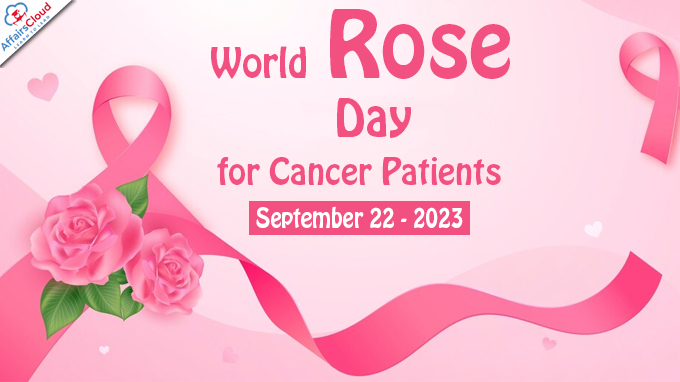 World Rose Day, also known as the Day for Welfare of Cancer Patients is annually observed across the globe on 22 September and is dedicated to cancer patients all across the globe and also encourages and acknowledges cancer survivors all over the world.
World Rose Day, also known as the Day for Welfare of Cancer Patients is annually observed across the globe on 22 September and is dedicated to cancer patients all across the globe and also encourages and acknowledges cancer survivors all over the world.
- The day aims to bring happiness and hope into the lives of such patients and reminds them that they can emerge victorious in their battle against cancer through determination and positivity.
Note: Cancer refers to any one of a large number of diseases characterized by the development of abnormal cells that divide uncontrollably and have the ability to infiltrate and destroy normal body tissue.
Background:
i.The origin of World Rose Day is credited to a 12-year-old Canadian girl named Melinda Rose, who was diagnosed with a rare form of blood cancer (Askin’s Tumor) in 1994.
ii.The day is reportedly observed in memory of Melinda Rose, who passed away from the disease in 1996.
Why the Rose?
i.The rose symbolises love, hope, and empathy, making it the perfect emblem for this day.
ii.It reminds everyone to be compassionate and understanding toward cancer patients.
- On World Rose Day, people offer roses, cards, and gifts to cancer patients and their caregivers, who also play an important role in this difficult journey.
Cancer Ribbons:
i.Cancer ribbons are loops of ribbon that people wear to show their support for those with cancer or to spread awareness about the disease.
ii.There are over 50 different ribbons, which represent different cancers and their survivors and caregivers today.
Significance:
i.Awareness: The day raises awareness about the importance of early detection and cancer prevention. It encourages individuals to undergo regular screenings and adopt a healthy lifestyle.
ii.Fundraising: Many organizations use World Rose Day as an opportunity to raise funds for cancer research and support programs.
iii.Honour: This day commemorates the bravery of cancer survivors while paying tribute to those who lost their lives to this relentless disease.
Key Points:
i.According to the World Health Organization(WHO) Globally, Cancer is a leading cause of death, which accounts to around 10 million deaths in 2020, or nearly 1 in 6 deaths. The most common cancers are breast, lung, colon and rectum and prostate cancers.
ii.Pan American Health Organization (PAHO), regional office for the Americas of WHO states that cancer burden will increase by approximately 60% over the next two decades, further straining health systems, people, and communities.
- By 2040, the global burden is expected to increase to nearly 30 million new cancer cases, the most significant increases will occur in low- and middle-income countries (LMICs).




